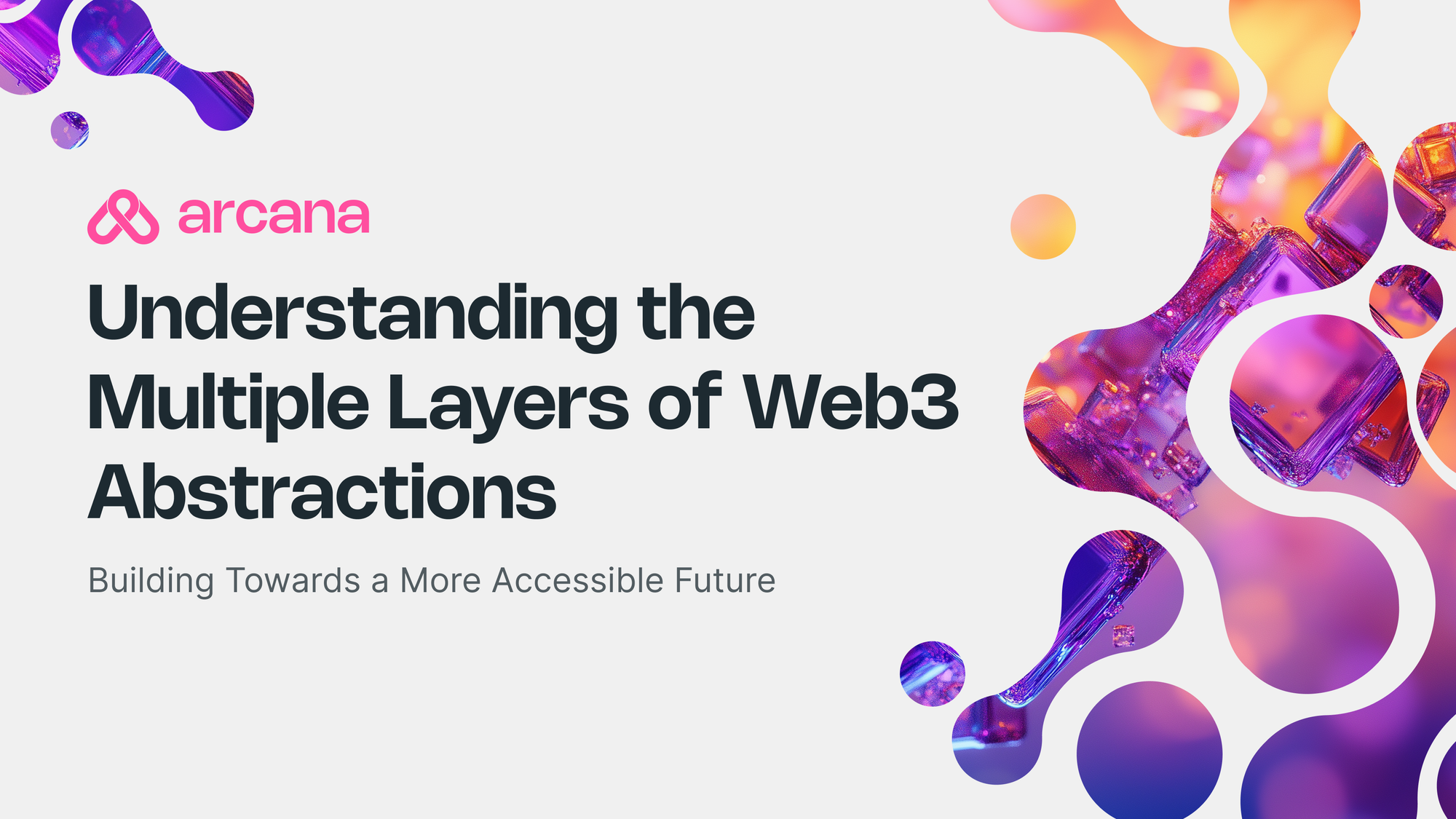Web3 Abstractions: Building Towards a More Accessible Future

Web3 is a complex world, brimming with revolutionary potential but burdened with challenges that make it intimidating for new users and developers alike. As blockchain technology matures, the focus has shifted from merely building decentralized applications to making them accessible for all. This shift has driven the creation of abstraction layers designed to simplify technical barriers, offering intuitive user interfaces and streamlined tools for developers.
In traditional web development, abstractions have allowed developers to operate at high levels without delving into the underlying details. Web3 needs a similar approach, but the challenges are unique: managing private keys, handling gas fees, and ensuring cross-chain compatibility. To drive mass adoption, Web3 must deliver better experiences for both developers and users. This blog explores the key areas of Web3 abstractions, culminating in Chain Abstraction, which unifies all other layers and holds the promise of seamless blockchain interactions.
Account Abstraction
Account abstraction is one of the foundational steps toward simplifying Web3 interactions. Traditional Web3 wallets, controlled via Externally Owned Accounts (EOAs), rely solely on private keys for access. In contrast, smart contract wallets enable programmable accounts, paving the way for account abstraction. These wallets go beyond simple transactions to offer features like social recovery, batched transactions, and customizable security settings.
Key Benefits:
- Social Recovery: Lost keys no longer mean lost funds. Users can designate trusted contacts to help recover their accounts.
- Batched Transactions: Multiple actions can be grouped into a single transaction, reducing costs and user effort.
- Customizable Security Rules: Advanced settings, such as multi-factor authentication and withdrawal limits, enhance account security.
Implementations like Ethereum’s ERC-4337 are leading the charge. By introducing bundlers (to aggregate and optimize transactions) and paymasters (to support flexible fee models), account abstraction removes reliance on private keys and makes onboarding easier.
Example Use Case: A DeFi app could allow users to create a smart contract wallet with daily spending limits, social recovery options, and batched token swaps—simplifying the experience for non-technical users.
Wallet Abstraction: Private Keys Through Social Authentication
Managing private keys is one of Web3’s steepest hurdles. Wallet Abstraction focuses on making web3 login experiences more familiar and seamless, similar to Web2 applications. With social logins, email/password combinations, or even passwordless options, users can access decentralized applications without needing to handle the intricacies of blockchain accounts. Solutions like Arcana Network’s wallet-as-a-service abstract this complexity using familiar social login methods, such as Google authentication, email logins, or OTP-based sign-ins. Users create wallets without directly handling cryptographic keys; instead, private keys are managed securely on the backend.
Enhancing Security with MPC: Arcana leverages Multi-Party Computation (MPC) to split private keys into fragments stored across different nodes. This approach increases security without complicating the user experience.
When a user authenticates through familiar methods like OAuth2.0 or email verification, the system handles JWT token management and secure session creation. Behind the scenes, a sophisticated key management backend generates and stores encrypted keys, implementing multiple backup mechanisms for reliability.
Arcana Auth seamlessly integrates Web2-like authentication while handling blockchain account creation and session management in the background. Developers can implement single sign-on, persistent sessions, and secure key storage, allowing users to focus on the app without worrying about wallet addresses or cryptographic keys.
Impact: Authentication abstraction enables frictionless onboarding, making Web3 applications as intuitive as their Web2 counterparts.
Gas Abstraction
Gas fees remain a significant source of friction in Web3. The concept of paying for transactions in native tokens (e.g., ETH on Ethereum) can confuse new users. Gas Abstraction addresses this by introducing techniques like gas sponsorships, meta-transactions, and gasless transactions.
Key Advancements:
- Gasless Transactions: Users interact with dApps without paying gas fees directly; the application or a sponsor covers the cost of gas fee.
- Flexible Gas Tokens: Pay gas fees in non-native tokens such as USDT, USDC, or others, removing the friction of having to hold chain-specific gas tokens.
Chain Abstraction
At the heart of seamless interoperability lies Chain Abstraction. It allows users to interact with multiple blockchains without manual network switching. Enabling asset transfers, protocol interactions, and unified balance management across chains.
Key Features:
- Unified Balances: Users can view and manage assets from multiple chains in a single interface, reducing the need for manual network navigation.
- Cross-Chain Functionality: Applications can leverage the best features of various chains without requiring users to switch network
The Arcana Wallet helps you "spend on any chain", allowing users to manage assets across multiple chains without navigating between them manually. Chain Abstraction enables applications to access the best functionality from each chain, simplifying the development process and enhancing user flexibility.
Application-Level Abstraction
For developers, application-level abstractions transform how dApps are built and deployed. By decoupling the apps functionality, from the underlying infrastructure that powers the app, users can use apps that leverage multiple chains and protocols without knowing the intricacies of the infrastructure. Modern development tools provide:
Here are some key aspects:
- Composable Modules: By using modular designs, developers can create applications that integrate seamlessly with other decentralized services.
- Customizable UI/UX: Allowing users to interact with dApps in a way that feels natural to them, without overloading them with technical information.
- Interoperable Standards: Ensuring applications can work across various chains by adhering to standards like ERC-20 or ERC-721 tokens for assets, and ERC-4337 for accounts.
Chain Abstraction leading the future of Abstractions
The future of Chain Abstraction lies in integrating individual abstraction layers into cohesive, intent-based systems. In such systems, users specify what they want to achieve (e.g., "swap tokens"), and the application handles the underlying complexities, from gas to network compatibility.
With the rise of intent-based systems, cross-chain functionalities, and interoperability standards, blockchain developers can create applications with higher efficiency, making web3 far more accessible and appealing to the mass market.
Abstraction is the bridge between blockchain’s technical complexity and the user-friendly design required for mass adoption. By advancing account, key management, authentication, gas, and chain abstractions, developers are transforming Web3 into a platform for everyone.
As these solutions mature, Web3 will evolve from a niche tool for technologists to a universally accessible ecosystem, unlocking the full potential of decentralized technologies. Arcana is at the forefront of this transformation, building tools that simplify Web3 for developers and users alike. If you’re ready to experience the future of Web3, stay tuned for our SDK launch.
About Arcana Network
Arcana Network is a leading Chain Abstraction Protocol powered by a modular Layer 1, aimed at transforming the Web3 UX. Arcana’s Chain Abstraction eliminates asset fragmentation and the friction of bridging between chains. It offers users a Unified Balance of their assets across chains, allowing them to spend their entire USDC, USDT, and ETH on any chain instantly, without bridging—a seamless, bridgeless, and near-instant experience.
Arcana has raised $4.5M from 40+ leading investors including Balaji S, Founders of Polygon, John Lilic, Santiago Roel, and funds like Woodstock, Republic, Fenbushi, Polygon Ventures, DCG, and others. Our native token $XAR is listed on Bybit, Gate, and MEXC.
Curious to experience the power of Chain Abstraction?
Download & Test Arcana Wallet on Chrome Store.
Join our growing community: Website | Twitter | Telegram | Youtube

